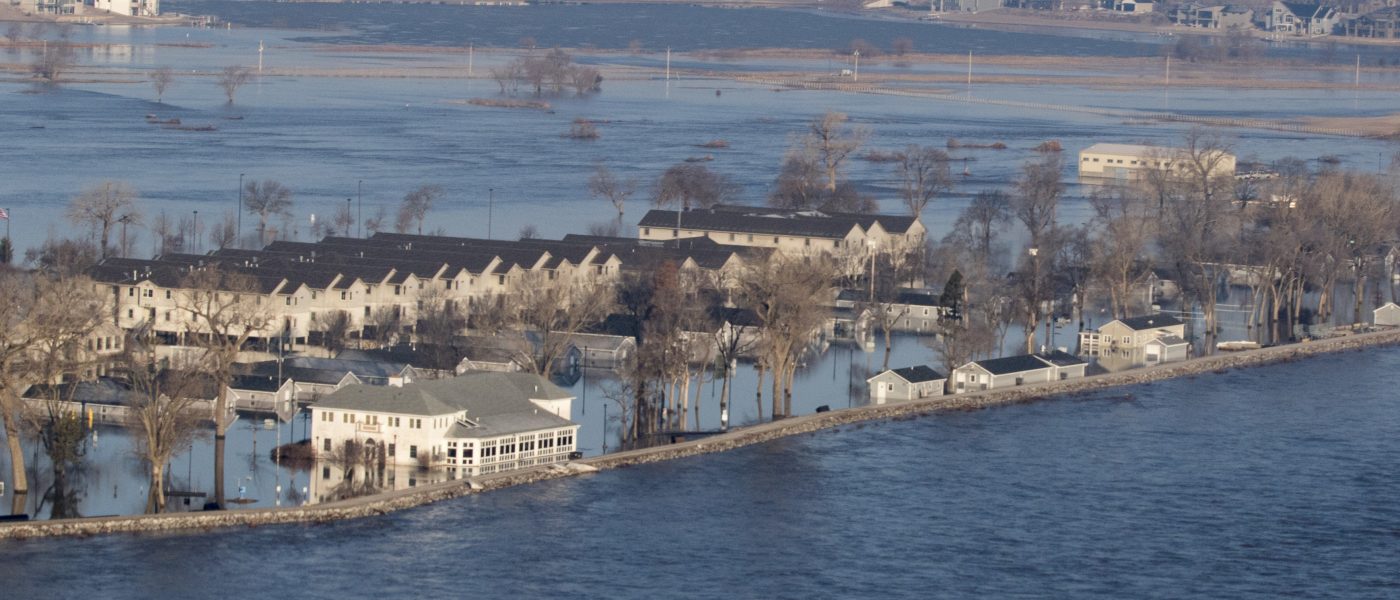Here at Farm Aid we make sure to highlight what’s happening on the ground for family farmers—an important task, as often the trials and tribulations of farmers get overlooked in favor of other news stories. Between the slumping farm economy, including tariffs and trade wars, and flooding that has devastated many Midwestern farms, farmers are facing a lot right now. We strive to make sure that these important issues are lifted up to give the public a sense of the current conditions in farm country.
Below are two instances where our Advocacy and Farmer Services Director, Alicia Harvie, explained how the Midwest floods have been impacting farmers throughout the spring.
The Washington Post: Extreme weather is pummeling the Midwest, and farmers are in deep trouble
“The story of the natural disasters and the flooding that’s been going on in the Midwest sits within a multiyear slump in farm prices,” said Alicia Harvie, the advocacy and farmer services director for Farm Aid. “It’s another wave of an ongoing crisis. It is a perfect storm. It cannot be overstated, the amount of stress and angst in farm country right now.”
Harvie said there are farmers who chose to fill their silos and wait out the suppressed farm prices, only to have floodwaters wash it all away.
Some farmers blame this spring’s extreme weather on the changing climate, another example of the way Mother Nature has become increasingly unruly and unpredictable, alongside historically strong hurricanes, bitter cold and devastating, deadly wildfires. Others, like Culp [a farmer in northwest Indiana], say they’ve accepted that farmers can’t control the weather — and should instead look to federal aid and insurance programs that help people like him when the crops don’t cooperate.
Last week, President Trump and Agriculture Secretary Sonny Perdue announced a $16 billion farm aid package to offset losses felt by the U.S. trade war with China. Perdue told reporters that $14.5 billion of the total package would go directly to producers so that “farmers will not bear the brunt” of the tariff showdown.
Other opportunities for support are caught up in congressional gridlock. The Senate voted last week to approve a multibillion-dollar aid package for communities nationwide that have been hit by natural disasters, including those affected by hurricanes in Puerto Rico and the South, wildfires on the West Coast and the flooding that continues to inundate those in the Midwest.
The House’s version of the bill is being held up by Republicans who want it to include funding for Trump’s proposed wall along the U.S.-Mexico border. The House is expected to vote on the measure next week.
“Funding delayed is funding denied, with farm and agriculture,” Harvie said. “The timing is everything.”
Harvie said that the Farm Aid hotline has been inundated with calls from concerned farmers who are “actively in disaster triage.” Last year, they had a 109 percent increase in calls over those received in 2017, she said. Usually, about 20 to 30 percent of calls are crisis-related. By the end of last year, nearly 75 percent were related to natural disasters. Most weeks, they get calls from farmers who say they are suicidal.
“I can’t even hardly put it into words, it’s just so defeating,” said Bev Lydick, whose family has been farming in Nebraska’s Burt County, along the Missouri River, since 1857. “We have water standing in some fields that we’ve never seen water stand in.”
She said she believes climate change is a contributing factor, and joins a chorus of other farmers in her small community of 1,800 who think the Army Corps of Engineers and Congress bear some responsibility for the way their waterways are being managed.
Read the rest of this story on The Washington Post’s website.
[inlinetweet prefix=”” tweeter=”@FarmAid” suffix=”” utmcampaign=”Alicia quote 4 try” utmsource=”” utmmedium=”” utmterm=”” utmcontent=”” related=”@FarmAid” relateddesc=”” replacement=”Funding delayed is funding denied, with farm and agriculture…The timing is everything – says Alicia Harvie, Farm Aid’s Advocacy and Farmer Services Director”]Funding delayed is funding denied, with farm and agriculture…The timing is everything – says Alicia Harvie, Farm Aid’s Advocacy and Farmer Services Director[/inlinetweet]
ABC News: US farmers face historic delays from flooded fields amid Trump tariffs
Alicia Harvie, director of advocacy and farmer services at Farm Aid, runs a hotline that works with dozens of farmers a month. Harvie said the flooding could create a crisis for American farmers on par with the 1980s, when a large number of family farms closed.
She said the flooding and trade issues causing problems now are hitting farms already strained by declining prices and mounting debt.
“The average farm family last year made a negative number for their salary,” she said. “What other job do we have where we expect somebody to lose money to do their job every day?”
Hurst [farmer and Missouri Farm Bureau] said there’s also been an emotional toll on farmers who watched their fields fill with rainwater around the same time U.S.-China trade talks broke down.
Hurst, who operates his farm with his dad, brothers, nephews and sons-in-law, said his family still has 2,400 acres of soybeans and a greenhouse, but they haven’t decided yet what to do with their flooded land.
“The change in mood,” he said, “has been pretty drastic in the last 30 days.”
Read the rest of the story and watch a corresponding video on ABC News’ website.
In response to the spring 2019 floods in the Midwest, Farm Aid activated our Family Farm Disaster Fund to assist farmers affected by the devastating flooding across the Midwest. Farm Aid works with family farmers, ranchers and farm organizations to provide emergency grants, help farmers understand and navigate their recovery options, and advocate for disaster assistance. Recovery from disasters like these takes months – if not years – and one hundred percent of every dollar donated to this fund goes to these efforts. To date, we’ve raised more than $178,000.
Please make a gift today to assist struggling farmers and ranchers and, for an update on recent recovery efforts associated with the Midwest floods, click here.



